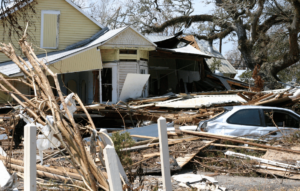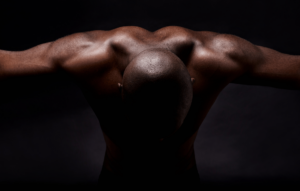In the wake of what I thought would be a tropical storm, but ended up being Hurricane Helene, I found myself at the epicenter of a disaster that tested everything I thought I knew about preparedness, strength, and masculinity. When the power grid failed, roads were swallowed and washed away by floodwaters, and chaos enveloped society, the reality of the situation hit hard. There were no safety nets, no luxuries, and no conveniences. It was raw, and it exposed something far more troubling: how few men were prepared to rise to the challenge, and how many broke under the pressure.
Modern life has made us soft. We live in a bubble of comfort that, while appealing, has robbed many men of their edge as well as their character. Disasters like Hurricane Helene strip away the façade and force us to confront the uncomfortable truth: we are not as ready as we should be. The ability to respond, act, and lead in such situations requires strength – physical, mental, and emotional – that too many have allowed to waste away. It’s time we reclaim that strength.
This blog is a call to action for men. In a world that increasingly encourages complacency, we need to embrace the traits that have always defined true masculinity: leadership, resilience, preparedness, and critical thinking. Strange times call for strong men, and there’s no better time to start preparing than right now.
The Crisis of Modern Masculinity
The first challenge we face as men is admitting that we’ve grown too comfortable. Our modern world makes it easy to avoid anything that feels remotely challenging. We have technology that handles most of our problems, from navigation to grocery shopping. While these advances are convenient, they’ve also led to a decline in skills that used to be second nature to men — skills that were essential for survival.

This “softness” isn’t just a physical issue; it’s mental and emotional as well. Men are often encouraged to avoid conflict, dodge responsibility, and stay within the boundaries of their comfort zones. But during a disaster, there’s no hiding from the hard truths. Suddenly, you’re forced to confront real adversity, and how you respond defines you.
The reality is that we’ve lost touch with the core traits that once defined masculinity – traits like physical toughness, the ability to remain calm under pressure, and the willingness to take decisive action. This blog isn’t about going back to some outdated notion of manhood; it’s about reclaiming the timeless qualities that allow us to thrive in challenging situations.
Fitness – The Foundation of Survival
Physical fitness is not a luxury; it’s a survival tool. When disaster strikes, your body becomes one of your most valuable assets. Whether you’re helping extract people from being trapped in their homes, clearing a road of debris, or enduring any the physical demands of a crisis – of which there are many – your fitness level can mean the difference between life and death for you and the people around you.
During Hurricane Helene, it was clear who had put in the work to stay strong and who hadn’t. Those who were fit and prepared were able to act quickly – helping neighbors, clearing paths, and moving supplies. Those who weren’t struggled just to get through the day – forget assisting others.
Fitness isn’t about vanity; it’s about functionality. When you’re caught in a disaster, no one cares about how much you can bench or what your abs look like. What matters is whether you can carry a child to safety, lift heavy objects to clear a path, or endure long stretches of physical exertion without breaking down.

The bridge is gone, there are multiple landslides, scores of fallen trees, and many powerlines draped across the only road up the mountain where your people are and you don’t know if they’re even alive – can you climb to the top? This was the reality I faced on Saturday, September 28th.
Functional strength, endurance, and mobility are the foundations of true masculinity in times of crisis.
As men, we need to prioritize fitness with a purpose. Train to be ready – not just for how you present yourself to the world, but for the actual demands of life in the natural world when the glass walls of your climate-controlled terrarium are broken. Strength training, cardiovascular endurance, and flexibility are not optional. They are necessary components of being able to protect yourself, your family, and your community when disaster strikes.
Preparedness – A Key to Leadership
Preparedness is an act of leadership.
7 Ps: proper preparation and planning prevents piss-poor performance. In times of crisis, people look for those who have the knowledge, skills, and foresight to lead. The problem is, most men today don’t think about disaster preparedness until it’s too late.
Being prepared goes beyond stockpiling food and water. It means thinking through potential scenarios, having a plan, and ensuring that you and your family are ready for anything. Do you have an evacuation route? Do you know how to provide first aid? Have you thought about how you would handle a prolonged power outage? Where can you get clean drinking water? Do you know your neighbors? These are the kinds of questions every man should be asking himself.
The responsibility to lead and protect falls squarely on your shoulders as a man. That might sound old-fashioned, but it quickly is revealed to be the truth in a crisis. In a disaster, someone has to step up, and men should be ready and willing to take on that role. Preparedness is not fear-mongering; it’s leadership in action.
Start small. Build an emergency kit. Create a plan with your family that covers potential disaster scenarios. Practice drills, learn basic survival skills, and understand how to respond to a crisis. The more you prepare now, the less you’ll have to worry about when disaster strikes. Preparedness isn’t just about survival – it’s about ensuring that you can lead and protect others when it matters most.

Emotional Regulation – Keeping Calm in the Storm
Emotional regulation is one of the most underrated aspects of true strength. When disaster strikes, panic is often the first response. But the ability to remain calm under pressure is a hallmark of strong leadership. Men who can control their emotions in high-stress situations are the ones who make clear, rational decisions that keep themselves and others safe.
During Hurricane Helene, I am proud to have witnessed men who managed to keep their composure even when things seemed dire. These men were able to stay focused, act decisively, and help others – while those who let their emotions run wild contributed to the chaos, robbing people and pulling guns on their neighbors in the line of the only functioning gas station.
Contrary to outdated stereotypes, emotional regulation doesn’t mean suppressing your emotions. It means mastering them. You can feel fear, anger, or anxiety, but staying in control of those feelings is key. Being a man in a crisis means being the calm in the storm – the person others can look to for guidance. 
There are practical ways to cultivate emotional resilience. Practices like mindfulness, controlled breathing, and meditation can help you build the mental fortitude to remain steady in a crisis. Emotional regulation is a skill that must be trained like any other, and the more you practice, the more effective you’ll be when disaster strikes.
Critical Thinking and Problem Solving
When disaster hits, critical thinking and problem-solving become invaluable skills. We live in a world where most problems are solved for us. GPS tells us where to go, YouTube shows us how to fix things, and the grocery stores provide food for us neatly wrapped in plastic. But when these systems fail, you need to be able to think on your feet.
During Hurricane Helene, some of the most valuable people were those who could quickly adapt to new challenges. Whether it was finding alternative routes when roads were flooded or figuring out how to access clean water, critical thinking was essential. Men who could think on their feet and solve problems were the ones who rose to the occasion and saved lives.
Sharpening your critical thinking skills doesn’t require you to be in a crisis all the time. Everyday activities like strategy games, puzzles, and challenging outdoor activities can help build the mental agility needed to respond to emergencies. Cultivate the ability to think fast, solve problems, and adapt to changing circumstances. Pick up a book. Start writing. Start where you can.
Reclaiming Masculinity in a Soft World
In a world that seems to increasingly dismiss masculinity as toxic or outdated, the truth is that masculine traits are more important now than ever. The softness encouraged by modern conveniences won’t help you when disaster strikes. But the qualities traditionally associated with masculinity – strength, leadership, resilience, and composure – are what will see you and your loved ones through challenging times.
This isn’t about rejecting modern life, but about recognizing that some things don’t change. When disaster hits, men who have embraced their role as protectors and leaders are the ones who make a difference. The world needs more strong men – men who are physically capable, mentally sharp, and emotionally resilient.
It’s time to reject the softness that’s crept into our lives and embrace the strength that comes with true masculinity. And this is not just for ourselves, but for our families, our communities, and the world around us.
A Call to Action
We live in strange times, and disasters like Hurricane Helene remind us that nothing is guaranteed. When systems fail, will you be ready? Will you be strong enough to protect your loved ones, calm enough to make rational decisions, and prepared enough to lead when others can’t? Will you rise up when no one is coming to save you?
enough to protect your loved ones, calm enough to make rational decisions, and prepared enough to lead when others can’t? Will you rise up when no one is coming to save you?
Now is the time to reclaim your strength, hone your skills, and embrace the traits that define true masculinity. Fitness, preparedness, emotional regulation, and critical thinking aren’t just helpful in a crisis – they’re essential. Strange times call for strong men. The question is: will you be ready when the next disaster strikes?








